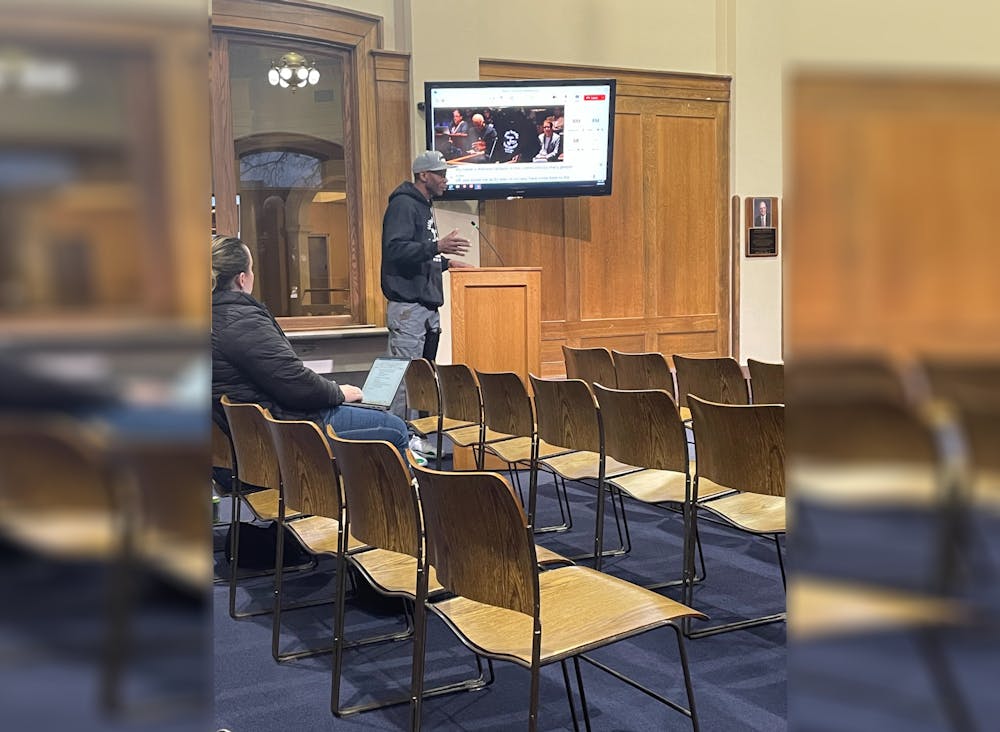About 30 community members gathered Monday night to discuss Integrated Reentry and Correctional Support, an Indiana-based peer support program that may soon be implemented in the Monroe County Jail.
Commissioner Penny Githens led the meeting alongside Jayme Whitaker, executive director of IRACS and vice president of Indiana Forensic Services. IFS is itself a division of Mental Health America of Indiana.
In jails participating in IRACS, inmate participants work with an in-house team who helps with re-entry resource navigation, recovery planning and accountability. Support includes both one-on-one and group meetings. Inmate participation is voluntary.
Unlike psychiatrists or social workers, members of IRACS teams are not clinicians. Instead, they are certified peer professionals — people in substance use recovery who have received training to work with others dealing with similar issues.
In 2022, IRACS launched its first initiatives in Blackford, Daviess, Dearborn, Delaware and Scott County jails. Whitaker said that data from those sites demonstrated a 75% success rate, which he defined as continued engagement with services.
The sheriff’s office and commissioners have been in talks with Whitaker since last year. Monday’s meeting aimed to assess whether community members supported the program.
Since its inception, IRACS expanded to Fayette and Clark counties in July and currently has room to include two more. Monroe is now one of several dozen counties vying for a slot.
Whitaker estimated that implementation in Monroe County would cost around $425,000 in the first year. Grants from Recovery Works, a program of the Indiana Family and Social Services Administration, fund positions inside the jail. Monroe County would fund positions outside of the jail. Participants are eligible for services during their first month of community re-entry.
Githens indicated the possibility of using federal funding or opiate settlement monies toward IRACS. Monroe County is set to receive about $2 million following national litigation with Purdue Pharma, the maker of OxyContin. Funds, which will be distributed over 18 years, are intended to go toward drug recovery and harm reduction efforts.
In a Feb. 23 press release, Githens also suggested that reduced recidivism associated with IRACS could save money, freeing up funds to support the initiative. Whitaker estimated a 25% reduction in inmate population among participating jails so far.
AJ Jackson, owner of Big Boy’s Moving, called on the county to invest more in employers who are willing to hire people with criminal records rather than another nonprofit initiative that can do little to change the opportunities people have upon leaving jail.
There are “enough nonprofits in our community at this time,” Jackson said.
Whitaker responded that one of IRACS’s main goals is to help participants navigate and access resources rather than provide them directly. He said in participant counties, IRACS partners with existing nonprofits in each county to deliver services.
Monroe County has been in the process of planning a new jail for several years. A federal court case filed by the ACLU in 2008 alleged that the facility’s conditions were unconstitutional, and the county entered into a settlement agreeing to eventually build a new jail.
Sheriff Ruben Marté’s office has raised multiple concerns about infrastructure and a lack of inmate programming since taking over jail administration last year.
The jail’s daily population is about 200 inmates. Two mental health professionals provide services for the entire facility. The Justice Fiscal Advisory Committee recommended adding a third to the County Council in September 2023.
Assistant jail commander Phil Parker acknowledged that while staff addresses acute crises, the facility’s cramped conditions and tight budget make it difficult to provide inmates with ongoing mental health treatment and reentry services.
“Right now, we’re reactive,” Parker said.
The results of an on-site jail assessment are currently pending. Whitaker said that he hopes to have an answer for Monroe County about its status as an IRACS participant by the end of March. If the county is chosen, implementation could begin as early as 2025.




